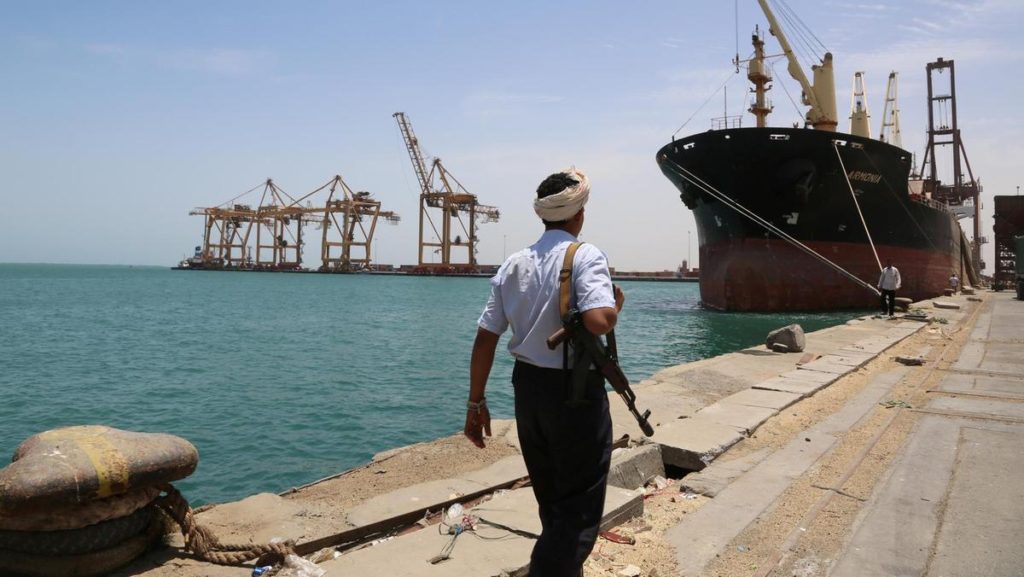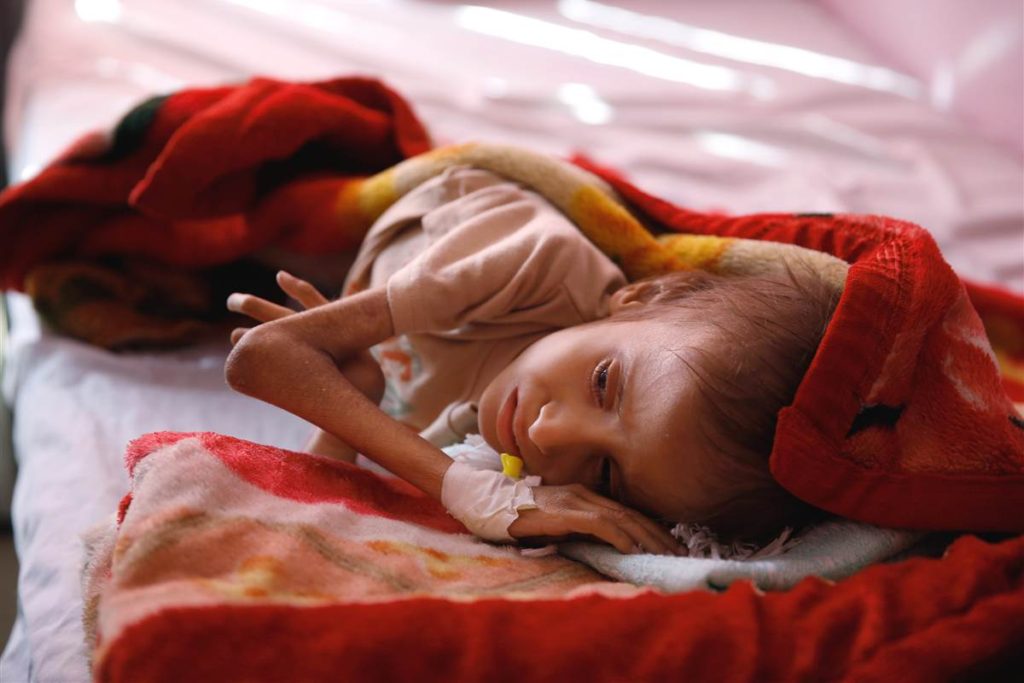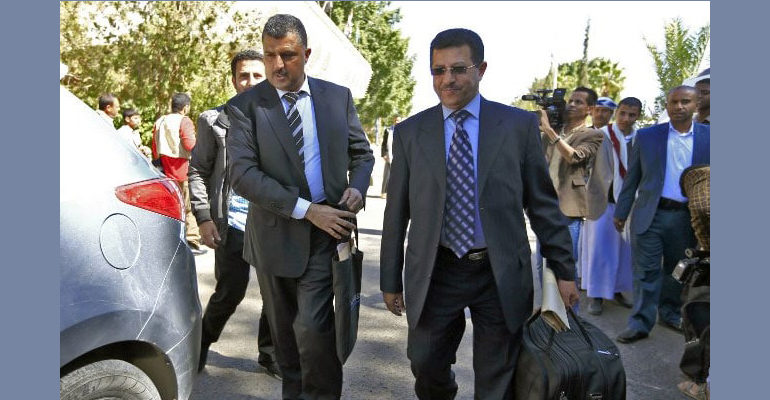STOCKHOLM — Yemen’s warring sides agreed to free thousands of prisoners on Thursday, in what a U.N. mediator called a hopeful start to the first peace talks in years to end a war that has pushed millions of people on the verge of starvation.
U.N. mediator Martin Griffiths told a news conference in a renovated castle outside Stockholm that just getting the warring sides to the table was an important milestone.
The war has killed tens of thousands of people and spawned what the United Nations calls the world’s direst humanitarian crisis, since a Saudi-led Arab coalition intervened in 2015 to restore a government ousted by the Houthi movement and their allies.
Warring sides agree to free thousands of prisoners
No talks have been held since 2016; and the last attempt in Geneva in September failed when Houthis representatives did not attend.
Griffiths said the prisoner swap agreed to at the start of the talks would reunite thousands of families. The International Committee of the Red Cross said at least 5,000 would be freed.
The war, widely seen across the region as a proxy conflict between Saudi Arabia and Iran, has been stalemated for years, threatening supply lines to feed nearly 30 million inhabitants.
The Houthis backed by Iran, control the capital Sanaa and most populated areas, while the ousted government based in the southern city of Aden has struggled to advance despite the aid of the Arab states led by the Saudis.
Humanitarian suffering in one of the world’s poorest countries has added to pressure on the parties to end the conflict, with faith in the Saudi-led war effort flagging among Western allies that arm and support the coalition.
Outrage over the Oct. 2 murder of Saudi journalist Jamal Khashoggi at the Saudi’s Istanbul consulate has also undermined Western support for Riyadh’s regional activities.
Diplomats are expected to shuttle between the warring parties to discuss other confidence-building steps and the formation of a transitional governing body, a U.N. source said.
The Swedish hosts called for constructive talks to end what Foreign Minister Margot Wallstrom called a “catastrophe.” Griffiths, flanked by the two delegations, told them not to waver.

A Houthi-aligned fighter walks through the Red Sea port of Hodeidah on May 10, 2017. -Reuters
Hodeidah Port, a sticking point
Griffiths wants a deal on reopening Sanaa airport, shoring up the central bank and securing a truce in Hodeidah, the country’s main port, held by the Houthis and a focus of the war after the coalition launched a campaign to capture it this year.
This could lead to a wider ceasefire to halt coalition air strikes that have killed thousands of civilians, and Houthi missile attacks on Saudi cities.
A U.N. source said that the two sides were still far from agreement on the three issues, especially on who should manage Hodeidah port and whether the Houthis should entirely quit the city.
“Hodeidah is very complex,” the source said.
The United Nations is trying to avert a full-scale assault on Hodeidah, the entry point for most of Yemen’s commercial goods and aid. Both sides have reinforced positions in the Red Sea city in sporadic battles after a de-escalation last month.
The other main route in and out of Houthi territory is the Sanaa airport, but access is restricted by the Saudi-led coalition that controls the airspace.
The head of the Houthis’ Supreme Revolutionary Committee, Mohammed Ali al-Houthi, said in a Twitter post that if no deal is reached to re-open the airport, the movement could close it on the ground to all traffic, including U.N. flights.
Number of Yemenis in food crisis or emergency could hit 20 million, according to U.N. World Food Program
Meanwhile, a survey of food security in Yemen has found more than 15 million people are in a “crisis” or “emergency” situation and that number could hit 20 million without sustained food aid, the U.N. World Food Program said in a statement on Thursday.
The survey, carried out by Yemeni and international experts in October according to an international system for classifying food crises, also found about 65,000 in a food “catastrophe” or near famine levels, mostly in conflict zones. That number that could rise to 237,000 if aid does not get through, the WFP said.

Millions of Yemeni children suffer from life-threatening malnutrition
‘Descent into hell’ in numbers
Nearly four years of civil war have spawned the world’s worst humanitarian crisis, killed tens of thousands of people and left more than 8 million facing famine.
“If the consultations fail, or stall, so too will hopes of halting Yemen’s steady descent into hell,” Mohamed Abdi, country director for the Norwegian Refugee Council, told the Thomson Reuters Foundation.
“We will be forced to watch on as a population is suffocated by violence, hunger and grief.”
Here are some facts about Yemen’s war:
– The war has killed about 57,000 Yemenis, including more than 2,500 children.
– Half of Yemen’s population, an estimated 14 million people, are on the brink of famine.
– Three-quarters of Yemenis, about 22 million people, are in need of emergency aid, including eight out of 10 children.
– 1.8 million children are severely short of food and 400,000 are suffering from life-threatening malnutrition.
– One Yemeni child dies every 10 minutes due to malnutrition and vaccine-preventable diseases.
– An estimated 2.3 million people, including 1 million children, are internally displaced in Yemen.
– Yemen needs billions of dollars to finance its 2019 budget and prevent a currency collapse, in addition to $4 billion in aid, according to U.N. humanitarian chief Mark Lowcock.
- Sources: Reuters, Norwegian Refugee Council, U.N. Office for the Coordination of Humanitarian Affairs, UNICEF, The Armed Conflict Location & Event Data Project






Leave a Reply